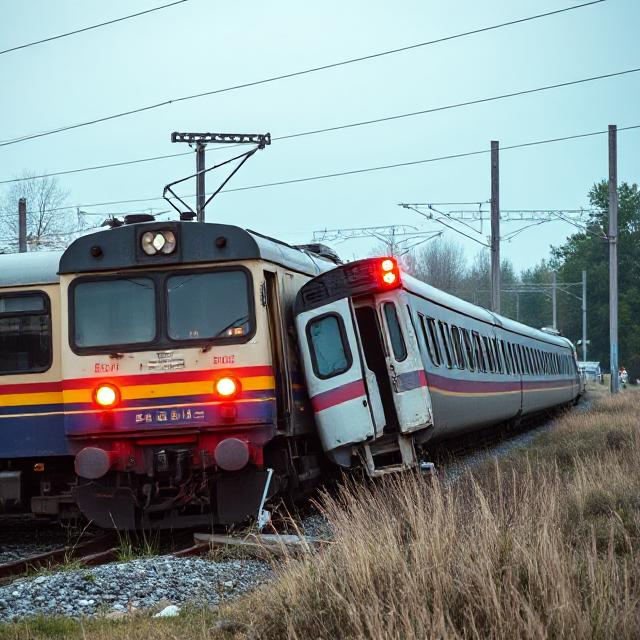Meta Description: From Mumbai's local train tragedy to the Pune bridge collapse, India is witnessing a chilling trend of preventable disasters. Is human life valued so little? A deep dive into India’s growing safety crisis.
Introduction: A Nation in Mourning, Again and Again
"Below zero"—that’s what it feels like the value of human life has come to in India. With each passing week, the country wakes up to fresh tragedies that could have been avoided. The recent Mumbai local train accident, the Ahmedabad plane crash, the stampede at the RCB stadium in Bengaluru, the collapse of a makeshift bridge in Pune, and the chaos during Puri’s Jagannath Rath Yatra—each one is a painful reminder that something fundamental is broken.
Are these just isolated incidents, or are they symptoms of a systemic failure? More importantly, are we truly valuing human life the way we should?
Mumbai Local Train Tragedy: A Daily Gamble with Death
Just days ago, a horrific local train accident in Mumbai claimed several lives and left dozens injured. Mumbai’s locals, the lifeline of the city, are bursting at the seams—overcrowded, under-maintained, and dangerously outdated. People cling to footboards or jump tracks in desperation to reach work. Authorities blame passengers. Passengers blame the system. But accountability remains missing.
Despite countless warnings and past tragedies, the upgrades remain slow, and safety measures are superficial at best. In a city that never sleeps, why does the infrastructure supporting it continue to fail so tragically?
Ahmedabad Plane Crash: Is Flying Safe Anymore?
A domestic flight approaching Ahmedabad airport skidded off the runway during landing, narrowly avoiding a mass disaster. Fortunately, fatalities were avoided, but it raised serious concerns about airport safety, emergency preparedness, and pilot training standards in India. The aviation sector has grown rapidly—but has safety kept pace?
India's skies are busy, but they must not become reckless. The need for stringent maintenance checks, better pilot fatigue management, and modernisation of airports is more urgent than ever.
Bengaluru RCB Stadium Stampede: When Celebration Turns Deadly
What was meant to be a joyful event—fans gathering at the Royal Challengers Bengaluru (RCB) stadium—turned into tragedy when a stampede broke out due to overcrowding and poor crowd management. Young lives were lost, and families were left shattered, all because basic safety protocols were ignored.
Why do such mass gatherings in India continue without clear evacuation plans, controlled entry, and proper security arrangements? The hunger for headlines should never come at the cost of human lives.
Pune Bridge Collapse: Crumbling Infrastructure, Crumbling Trust
In Pune, a recently built temporary bridge collapsed under the weight of a wedding procession, leading to deaths and multiple injuries. The structure, it turns out, had not been adequately tested or approved for such use.
What does it say about governance and civic planning when a simple bridge cannot hold a few hundred people? The cracks in infrastructure mirror the cracks in our accountability systems.
Puri Jagannath Rath Yatra Chaos: Faith Deserves Better Planning
The Jagannath Rath Yatra in Puri, one of India’s most revered religious events, was marred by disorganisation and injuries due to lack of coordination and inadequate crowd control. Faith brings people together—but when planning falls short, it also becomes the setting for loss and chaos.
Religious events of such scale must be matched with meticulous preparation, including medical support, controlled movement, and strict oversight.
The Larger Picture: Why Do We Keep Failing?
What ties these incidents together is neglect, apathy, and a staggering lack of accountability. India is a rising power, building smart cities and landing spacecraft on the moon—but somehow, we are failing to protect our citizens on the ground.
Lives are lost due to avoidable errors, corrupt tender processes, political interference, and a culture of "chalta hai" (it’s okay) that continues to plague public safety systems.
Media Coverage vs. Public Memory: A Dangerous Amnesia
Each disaster gets a few days of coverage, angry headlines, and social media outrage. But within a week, we move on. The victims remain only in the memories of their families, while the systems that failed them continue unchecked.
We need a public that demands answers, a media that follows up, and a leadership that prioritises safety over optics.
What Needs to Change? A Blueprint for Saving Lives
-
Strict Regulatory Oversight: Independent bodies must conduct safety audits across sectors—railways, aviation, public infrastructure.
-
Real Accountability: Officials responsible for negligence must face penalties—not just transfers.
-
Public Participation: Encourage whistle-blowers and reward citizens who report unsafe practices.
-
Transparent Budget Allocation: Make public the funds spent on safety infrastructure and its maintenance.
-
Real-Time Alerts & Technology: Use AI, drones, and sensor systems to manage crowds and monitor weak infrastructure.
Conclusion: The Worth of a Life Must Be More Than a Headline
If India aspires to be a global leader, it must begin by protecting its own people. Progress cannot be defined solely by skyscrapers, GDP growth, or global rankings. It must also mean that a child can walk across a bridge safely, that a fan can attend a match without fear, and that a commuter can reach home alive.
Until then, we must keep asking: Is life in India really worth less than zero?
Call to Action
If you’ve lost faith in the system, raise your voice, share this article, demand better from your elected leaders, and support platforms that push for public safety and accountability.




No comments:
Post a Comment